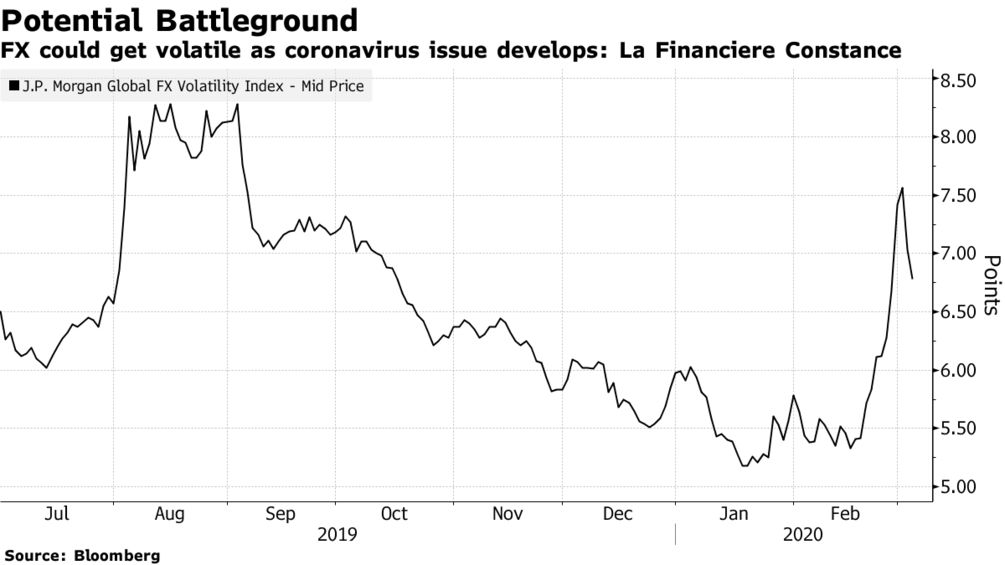Market Action
Global equities increased slightly on the week, but the coronavirus outbreak continues to influence markets. The yield on the US 10-year Treasury note hit an all-time low of 0.67% before bouncing back up to 0.76% The price of a barrel of West Texas Intermediate crude decreased from $44.65 to $42.65 and volatility, as measured by the Cboe Volatility Index (VIX), remained high at 45.
The number of confirmed cases of COVID-19 continues to grow. As of Friday afternoon, the virus had been reported in 79 countries and on every continent except Antarctica. The US has reported over 250 confirmed cases and 14 deaths in the last couple of weeks. In response, the US Senate approved $8.3 billion worth of emergency spending to combat the virus. Efforts to contain the outbreak, and the economic disruption it is causing, are being made around the world. Several countries, such as Italy and Japan, have decided to close schools and universities. Tourism, business travel, and entertainment venues are experiencing significant declines in demand and global supply chains are suffering disruption.
In an effort to cushion against the coronavirus’ economic impact, the US Federal Reserve cut interest rates by a half-percent. While markets briefly rallied after the announcement, they have continued their decline. Several other central banks, including the Bank of Canada and Reserve Bank of Australia, cut rates in order to coordinate policy. Fiscal measures are expected in the coming weeks as many countries explore ways to support vulnerable small and medium-sized businesses. China’s response to the virus in the last week has been much more subdued despite the fact that many factories and businesses remain closed.
Former Vice President Joe Biden took the lead in the race for the US Democratic presidential nomination. On “Super Tuesday” Biden overtook Vermont Senator Bernie Sanders by winning 10 out of the 14 states holding primary elections on Tuesday. Markets rallied in response to Super Tuesday results as many investors fear Sanders’ progressive agenda which is not favorable for businesses, and especially not for health insurers. Biden benefited from the withdrawal of Indiana Mayor Pete Buttigieg and Minnesota Senator Amy Klobuchar from the race, both of which endorsed Biden. After poor performances on Tuesday, Massachusetts Senator Elizabeth Warren and New York Mayor Michael Bloomberg also pulled out. Bloomberg endorsed Biden but Warren has yet to give official support of a candidate.
Turkey and Russia have agreed to a ceasefire in Syria’s northwestern Idlib province after a week of heightened tensions and severe escalation. The new agreement provides for a jointly patrolled security corridor but does not require Russia-backed Syrian government forces to withdraw from newly recaptured areas. According to the United Nations, the military conflict in the region has displaced nearly 1 million people since December.
European Union (EU) leaders are planning emergency steps to seal the Greek border after Turkey has eased its controls on outward migration. Up until this month, the Turkish government has prevented migrants from entering the EU in exchange for financial support. Following escalating violence in northwestern Syria which has led to an influx of Syrians crossing the border into Turkey, the Turkish government has fallen back on their deal with the EU. EU interior ministers have pledged to take all necessary measures to prevent illegal entries into the bloc.
What could affect the markets in the weeks ahead?
The European Union’s chief negotiator, Michel Barnier, said the United Kingdom showed signs of “very serious divergence” in the first round of post-Brexit trade talks. This divergence is evident on issues such as the UK’s alignment with EU rules, the enforcement of a future deal, and the role of the European Court of Justice, among other topics.
The Organization of the Petroleum Exporting Countries (OPEC) called for a production cut of 1.5 million barrels per day to curtail falling oil prices caused by the coronavirus outbreak. Member countries have agreed to cut 1 million barrels per day under the proposal, while non-member countries would share a cut of 500,000 barrels per day. Russia, a non-member but one of the world’s major oil producers, has not agreed to the cuts after talks with OPEC on Friday, causing crude prices to plunge. Whether or not OPEC will be able to reach a deal with Russia and whether or not the proposal will be successful in mitigating the effects of the coronavirus will be seen in the coming weeks.
Recommended Reads
Oil plunges as Opec output cut talks with Russia collapse
Corporate debt markets fret over coronavirus effects
India’s Chaotic Bank Seizure Sends Shockwaves Through Markets
A Global Outbreak is Fueling the Backlash to Globalization
The refugee crisis returns to Europe—or does it?
China Purchasing Indexes Drop to Record Lows as Epidemic Stalls Output
Here Comes the Coronavirus Pandemic
Israel, ‘Start-up Nation,’ Groans Under Strains of Growth and Neglect
This week from BlackSummit
Fed in Action, Volatility, and Expectations: Are There Any Clear Signs?
John E. Charalambakis
Crossroads: At the Intersection of Geopolitics and Geoeconomics
Rachel Poole
Image of the Week

Video of the Week
Migrants clash with Greek police at the Turkish border
Source: BBC
